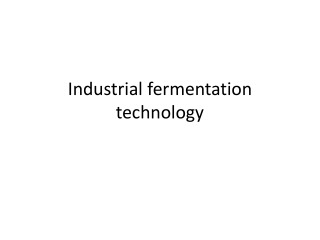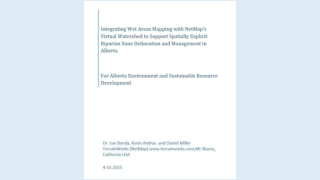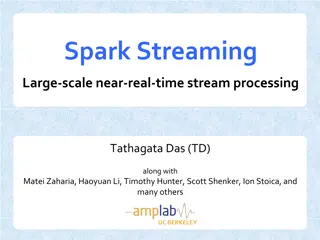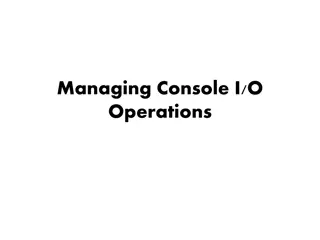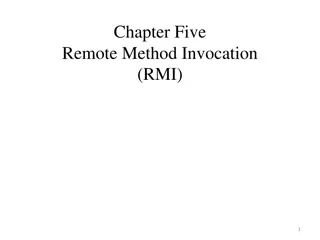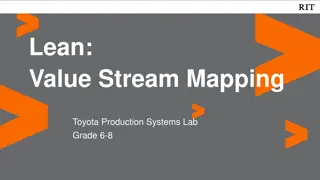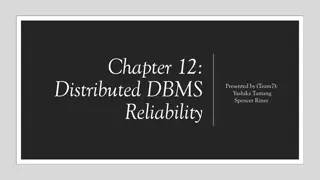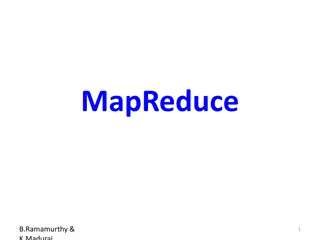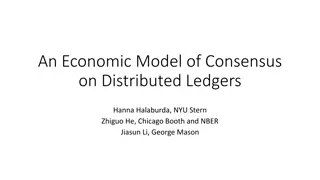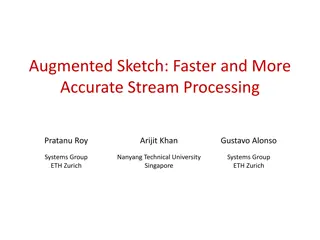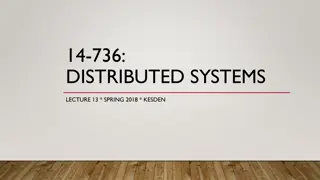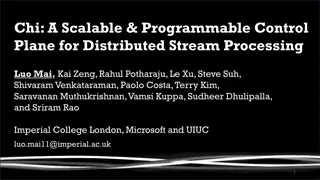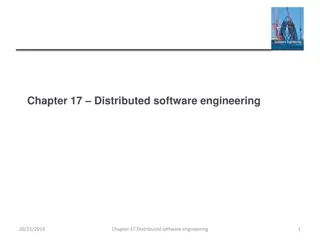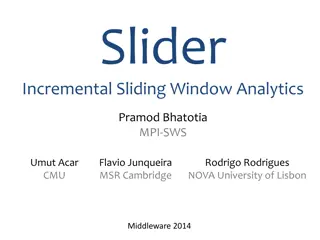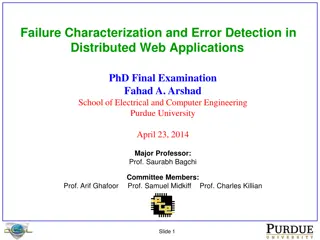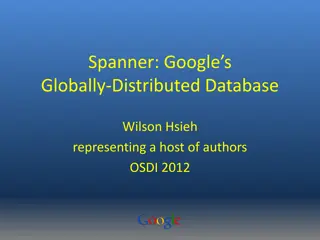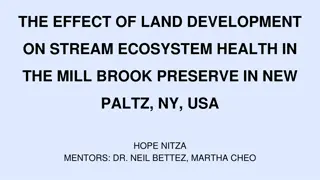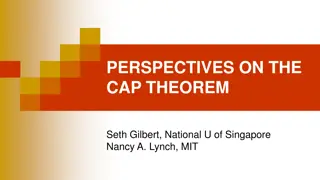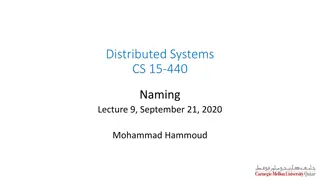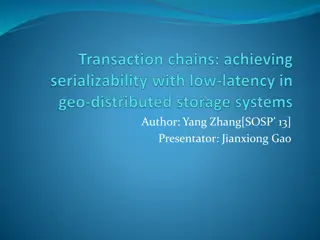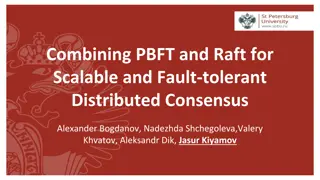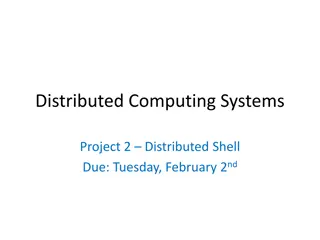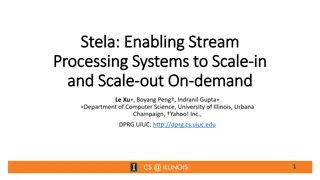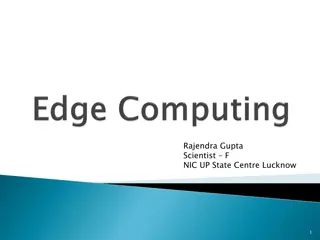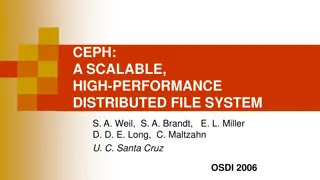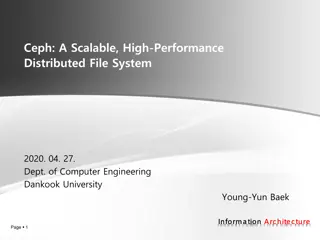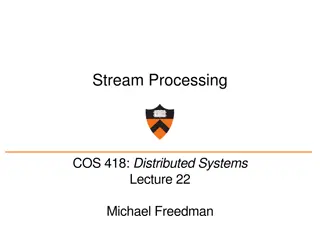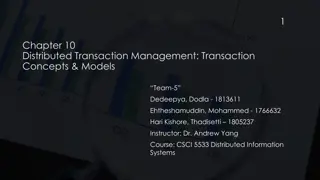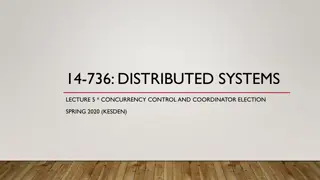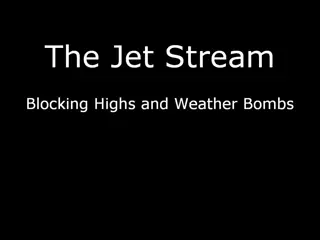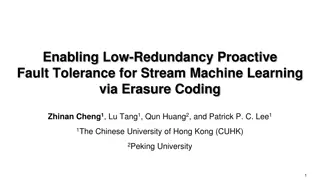Industrial fermentation technology
Industrial fermentation technology involves three key stages - Up-Stream Processing (USP), the fermentation process, and Down-Stream Processing (DSP). USP includes formulating the fermentation medium, sterilization, inoculum preparation, and improving desired microorganisms for increased productivit
1 views • 23 slides
Integrated Approach for Stream Network Development and Riparian Zone Analysis
This project aims to build a seamless stream network, apply riparian zone delineation tools, and assess various environmental factors affecting stream ecosystems. The integration of data and analysis tools provides a comprehensive understanding of stream dynamics and habitat potential.
1 views • 26 slides
Overview of Distributed Systems: Characteristics, Classification, Computation, Communication, and Fault Models
Characterizing Distributed Systems: Multiple autonomous computers with CPUs, memory, storage, and I/O paths, interconnected geographically, shared state, global invariants. Classifying Distributed Systems: Based on synchrony, communication medium, fault models like crash and Byzantine failures. Comp
9 views • 126 slides
Runoff
Runoff is the surface flow of precipitation in drainage channels that can be utilized for engineering purposes. Catchment characteristics, including stream order, drainage density, length of stream, form factor, and circularity ratio, play a crucial role in determining how well a watershed is draine
3 views • 30 slides
B.com and BBA (Arts) Stream preferred colleges in Tamil Nadu
If you\u2019re a 12th-grade student exploring B.com undergraduate options in the arts stream, consider the following list of recommended courses and colleges list of courses and colleges for arts stream courses.\n1. B.com\nB.Com stands for Bachelor of Commerce B.com, a UG degree course authorized by
2 views • 5 slides
B.Sc (Arts) Courses and Colleges List for Science Students
If you\u2019re a 12th-grade student exploring undergraduate options in the B.sc science stream, consider the following list of recommended courses and colleges\nThe list of courses and colleges for the Science stream:\n1. B.sc (CS)\nThe BSc Computer Science, or BSc CS, is a 3-year undergraduate prog
9 views • 5 slides
Introduction to Spark Streaming for Large-Scale Stream Processing
Spark Streaming, developed at UC Berkeley, extends the capabilities of Apache Spark for large-scale, near-real-time stream processing. With the ability to scale to hundreds of nodes and achieve low latencies, Spark Streaming offers efficient and fault-tolerant stateful stream processing through a si
0 views • 30 slides
#aamil kamil baba trending baba in pakistan stream kala jadu specialist amil bab
#aamil kamil baba trending baba in pakistan stream kala jadu specialist amil baba contact no 923253157897 hindu amil in multan tantrik baba in hydrabad#aamil kamil baba trending baba in pakistan stream kala jadu specialist amil baba contact no 923253157897 hindu amil in multan tantrik baba in hydr
0 views • 1 slides
#aamil kamil baba trending baba in pakistan stream kala jadu specialist amil bab
#aamil kamil baba trending baba in pakistan stream kala jadu specialist amil baba contact no 923253157897 hindu amil in multan tantrik baba in hydrabad#aamil kamil baba trending baba in pakistan stream kala jadu specialist amil baba contact no 923253157897 hindu amil in multan tantrik baba in hydr
0 views • 1 slides
#aamil kamil baba trending baba in pakistan stream kala jadu specialist amil bab
#aamil kamil baba trending baba in pakistan stream kala jadu specialist amil baba contact no 923253157897 hindu amil in multan tantrik baba in hydrabad#aamil kamil baba trending baba in pakistan stream kala jadu specialist amil baba contact no 923253157897 hindu amil in multan tantrik baba in hydr
0 views • 1 slides
Understanding C++ I/O Operations: Streams, Stream Classes, and Functions
C++ I/O operations involve managing console input and output using streams, stream classes, and functions. Learn about stream types, stream classes for console I/O, unformatted I/O operations, put() and get() functions for character I/O, getline() and write() functions, formatted console I/O operati
0 views • 37 slides
Understanding Parallel and Distributed Computing Systems
In parallel computing, processing elements collaborate to solve problems, while distributed systems appear as a single coherent system to users, made up of independent computers. Contemporary computing systems like mobile devices, IoT devices, and high-end gaming computers incorporate parallel and d
1 views • 11 slides
Understanding Remote Method Invocation (RMI) in Distributed Systems
A distributed system involves software components on different computers communicating through message passing to achieve common goals. Organized with middleware like RMI, it allows for interactions across heterogeneous networks. RMI facilitates building distributed Java systems by enabling method i
1 views • 47 slides
Understanding Value Stream Mapping in Toyota Production Systems
Value Stream Mapping is a powerful tool used by Industrial Engineers to visualize processes, identify areas of improvement, and enhance efficiency. This method involves numbering steps, naming each one, indicating paths with arrows, flagging problem areas with stars, and brainstorming solutions. Var
1 views • 7 slides
Distributed DBMS Reliability Concepts and Measures
Distributed DBMS reliability is crucial for ensuring continuous user request processing despite system failures. This chapter delves into fundamental definitions, fault classifications, and types of faults like hard and soft failures in distributed systems. Understanding reliability concepts helps i
0 views • 58 slides
Understanding MapReduce in Distributed Systems
MapReduce is a powerful paradigm that enables distributed processing of large datasets by dividing the workload among multiple machines. It tackles challenges such as scaling, fault tolerance, and parallel processing efficiently. Through a series of operations involving mappers and reducers, MapRedu
7 views • 32 slides
Economic Models of Consensus on Distributed Ledgers in Blockchain Technology
This study delves into Byzantine Fault Tolerance (BFT) protocols in the realm of distributed ledgers, exploring the complexities of achieving consensus in trusted adversarial environments. The research examines the classic problem in computer science where distributed nodes communicate to reach agre
0 views • 34 slides
Distributed Algorithms for Leader Election in Anonymous Systems
Distributed algorithms play a crucial role in leader election within anonymous systems where nodes lack unique identifiers. The content discusses the challenges and impossibility results of deterministic leader election in such systems. It explains synchronous and asynchronous distributed algorithms
2 views • 11 slides
Advancements in Stream Processing with Augmented Sketch Technology
Augmented Sketch is a cutting-edge technology developed by Pratanu Roy, Arijit Khan, and Gustavo Alonso at ETH Zurich and Nanyang Technical University. This technology enables faster and more accurate processing of data streams, including IP traffic, phone calls, sensor measurements, and web interac
0 views • 21 slides
Overview of Distributed Systems, RAID, Lustre, MogileFS, and HDFS
Distributed systems encompass a range of technologies aimed at improving storage efficiency and reliability. This includes RAID (Redundant Array of Inexpensive Disks) strategies such as RAID levels, Lustre Linux Cluster for high-performance clusters, MogileFS for fast content delivery, and HDFS (Had
0 views • 23 slides
Chi: A Scalable and Programmable Control Plane for Distributed Stream Processing
Distributed stream processing systems are increasingly crucial for various production use cases, such as real-time dashboards, machine learning, and interactive debugging. The challenges of handling large variability in production ingestion workloads and high-degree data skew in queries are addresse
1 views • 20 slides
Distributed Software Engineering Overview
Distributed software engineering plays a crucial role in modern enterprise computing systems where large computer-based systems are distributed over multiple computers for improved performance, fault tolerance, and scalability. This involves resource sharing, openness, concurrency, and fault toleran
0 views • 66 slides
Stream Processing for Incremental Sliding Window Analytics
This content explores the design requirements, state-of-the-art technologies, trade-offs, goals, and approach for achieving efficient incremental processing in stream analytics. It emphasizes the need to balance advantages of batch-based systems with the efficiency of incremental updates for sliding
0 views • 37 slides
Challenges in Detecting and Characterizing Failures in Distributed Web Applications
The final examination presented by Fahad A. Arshad at Purdue University in 2014 delves into the complexities of failure characterization and error detection in distributed web applications. The presentation highlights the reasons behind failures, such as limited testing and high developer turnover r
0 views • 53 slides
Google Spanner: A Distributed Multiversion Database Overview
Represented at OSDI 2012 by Wilson Hsieh, Google Spanner is a globally distributed database system that offers general-purpose transactions and SQL query support. It features lock-free distributed read transactions, ensuring external consistency of distributed transactions. Spanner enables property
0 views • 27 slides
Impact of Land Development on Stream Ecosystem Health in Mill Brook Preserve, NY, USA
The study focuses on the effects of land development on stream ecosystem health in the Mill Brook Preserve in New Paltz, NY. It discusses the degradation of water quality due to surrounding land development and the importance of macroinvertebrates as indicators of ecosystem health. The review of lit
0 views • 23 slides
Understanding the CAP Theorem in Distributed Systems
The CAP Theorem, as discussed by Seth Gilbert and Nancy A. Lynch, highlights the tradeoffs between Consistency, Availability, and Partition Tolerance in distributed systems. It explains how a distributed service cannot provide all three aspects simultaneously, leading to practical compromises and re
0 views • 28 slides
Understanding Distributed Hash Table (DHT) in Distributed Systems
In this lecture, Mohammad Hammoud discusses the concept of Distributed Hash Tables (DHT) in distributed systems, focusing on key aspects such as classes of naming, Chord DHT, node entities, key resolution algorithms, and the key resolution process in Chord. The session covers various components of D
0 views • 35 slides
Distributed Database Management and Transactions Overview
Explore the world of distributed database management and transactions with a focus on topics such as geo-distributed nature, replication, isolation among transactions, transaction recovery, and low-latency maintenance. Understand concepts like serializability, hops, and sequence number vectors in ma
0 views • 17 slides
Enhancing Distributed Consensus: Combining PBFT and Raft for Improved Security
Addressing challenges in distributed systems, this study proposes a novel approach by combining PBFT and Raft consensus mechanisms to enhance scalability and fault tolerance. The research highlights the importance of secure data storage and identifies new attack mechanisms in today's digital landsca
0 views • 11 slides
Distributed Computing Systems Project: Distributed Shell Implementation
Explore the concept of a Distributed Shell in the realm of distributed computing systems, where commands can be executed on remote machines with results returned to users. The project involves building a client-server setup for a Distributed Shell, incorporating functionalities like authentication,
0 views • 14 slides
Enhancing Stream Processing Systems with On-Demand Scalability
This study explores the importance of elasticity and on-demand scaling in stream processing systems, focusing on the development of the Stela system. It introduces novel metrics like Effective Throughput Percentage (ETP) and describes the implementation of on-demand elasticity within Storm without t
0 views • 26 slides
Understanding Edge Computing for Optimizing Internet Devices
Edge computing brings computing closer to the data source, minimizing communication distances between client and server for reduced latency and bandwidth usage. Distributed in device nodes, edge computing optimizes processing in smart devices instead of centralized cloud environments, enhancing data
0 views • 32 slides
Overview of Ceph Distributed File System
Ceph is a scalable, high-performance distributed file system designed for excellent performance, reliability, and scalability in very large systems. It employs innovative strategies like distributed dynamic metadata management, pseudo-random data distribution, and decoupling data and metadata tasks
0 views • 42 slides
Overview of Ceph: A Scalable Distributed File System
Ceph is a high-performance distributed file system known for its excellent performance, reliability, and scalability. It decouples metadata and data operations, leverages OSD intelligence for complexity distribution, and utilizes adaptive metadata cluster architecture. Ceph ensures the separation of
0 views • 23 slides
Stream Processing in Distributed Systems: Challenges and Examples
Stream processing involves real-time processing of large amounts of data, and is essential for tasks such as social network trend detection, fraud detection, and earthquake monitoring. This summary explores stateless and stateful stream processing techniques, including filtering, conversion, aggrega
0 views • 35 slides
Distributed Transaction Management in CSCI 5533 Course
Exploring transaction concepts and models in distributed systems, Team 5 comprising Dedeepya, Dodla, Ehtheshamuddin, and Hari Kishore under the guidance of Dr. Andrew Yang delve into the intricacies of distributed transaction management in CSCI 5533 Distributed Information Systems.
0 views • 56 slides
Concurrency Control and Coordinator Election in Distributed Systems
This content delves into the key concepts of concurrency control and coordinator election in distributed systems. It covers classical concurrency control mechanisms like Semaphores, Mutexes, and Monitors, and explores the challenges and goals of distributed mutual exclusion. Various approaches such
0 views • 48 slides
Impact of Weakening Jet Stream on British Isles Climate
Jet streams in warming climate show a faster increase in poles than in tropics and temperate zones. This shift affects the average position of the jet stream, likely moving it poleward. Consequently, the British Isles may experience a more Mediterranean-like climate, with deserts expanding northward
0 views • 43 slides
Low-Redundancy Proactive Fault Tolerance for Stream Machine Learning
This study focuses on enabling fault tolerance for stream machine learning through erasure coding. Fault tolerance is crucial in distributed environments due to worker failures, and existing approaches like reactive fault tolerance and proactive replication have drawbacks. The use of erasure coding
0 views • 20 slides
